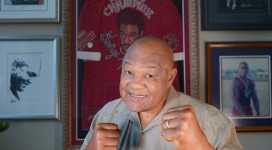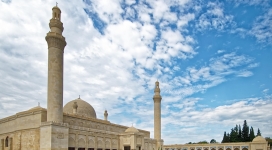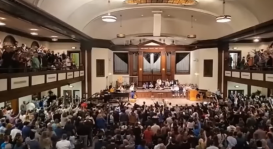WASHINGTON - Tucked inside a sleek modernist room just blocks from the U.S. Capitol sat a hand-picked group of diplomats and scholars invited to take on the weighty task of helping the world's most populous Muslim country resist becoming an Islamic state.
Former U.S. ambassadors, State Department officials, university professors and a high-level delegation from Indonesia were among the some two-dozen guests huddled in the room in the bustling Newseum last week under the banner of "Indonesia: A model for the Muslim world."
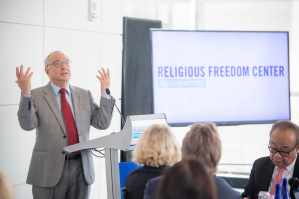
Yet despite its name, the gathering was anything but a celebratory party for Indonesia. Instead moderator Hon. Rabbi David Saperstein, former U.S. Ambassador-at-Large for International Religious Freedom, sounded the alarm that Islamic extremism was on the rise in the traditionally tolerant Southeast Asian country that prides itself on being the world's largest Muslim democracy and having a robust history of interreligious harmony.
Jakob Tobing, president of Leimena Institute and Indonesia's former ambassador to South Korea, reinforced Saperstein's concern.
"As you can see from the [Jakarta] election, the threat of radicalism is growing," stated Tobing, who helped lead the Indonesian parliament to rewrite its constitution that transitioned the country from dictatorship to democracy at the turn of this century. "Negligence of this consolidation has opened a very fertile soil for these ideas coming from the outside."
Tobing was referencing the recent defeat of Jakarta Governor Basuki "Ahok" Tjahaja Purnama - a double minority as a Christian and a person of Chinese descent. Ahok was the first Christian governor of Jakarta in over 50 years and only the second Christian governor of Jakarta in the history of Indonesia. He was defeated in his re-election bid by Anies Baswedan, a former education and culture minister and a Muslim.
In the weeks ahead of the Jakarta election, Muslim radicals in Indonesia protested in the thousands, calling for Ahok to be jailed for false blasphemy charges, and demanding Muslim voters (nearly 90 percent of the population) to only vote for Muslim politicians regardless of their politics. The uproar incited by Muslim hardliners turned the Jakarta election into a litmus test on the strength of Indonesia's foundational religious tolerance and harmony tenets. Ahok's defeat was unanimously seen as a sign of the strengthening power of radical Islam in Indonesia.
"I think the [Jakarta] election has become a wake-up call to all popular forces in Indonesia," reflected Alwi Shihab, the Indonesian president's special envoy to the Middle East and OIC and former minister of foreign affairs. "We have been so far complacent. We have been so proud to be seen as a model of Islamic religious tolerance and so forth. We are forgetful of the invasion of ideas and ideology."
The influential Muslim political leader noted that during the Jakarta election, extremists were "abusing verses of the Koran and intimidating Muslims" by saying "'If you vote for Ahok that means you vote against the will of God.'"
"We always say that the two largest organizations [in Indonesia] supporting the president will never fail - 'too big to fail.' But today we are in a different situation. Today we have to be alert and witness something we have never before."
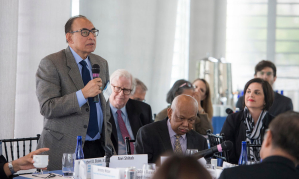
Shihab is a respected figure in the Nahdlatul Ulama, one of the two largest Muslim organizations in Indonesia, and an influential scholar in the country's interfaith dialogue.
In addition to Nahdlatul Ulama (NU), which has some 60 million followers, Indonesia's other major Muslim organization is Muhammadiyah, with about 40 million followers. These two Islamic political and social movements are strong supporters of the official national philosophy of Pancasila, which protects pluralism and officially recognizes religions other than Islam, including Christianity (Catholicism and Protestantism), Hinduism and Buddhism. Confucianism was added later in 2000.
Former Ambassador Tobing explained that democracy in Indonesia is possible mostly due to the way the Indonesian people see themselves.
"First of all it's our nationalism," explained Tobing.
Indonesia has over 1,000 tribes and ethnicities. During low tide, there are about 17,000 islands and during high tide some 13,000 islands. Indonesia is also a very large archipelago where going from Aceh to Papua takes about 7 hours to fly, comparable to a flight from Alaska to Miami. Indonesia also has more than 700 languages.
"But thanks to our founding mothers and founding fathers, we can mold this nationalism, which despite our diversity we look ourselves as one. So this is the strong foundation for a kind of democracy. We have a Muslim majority people who are very, very inclusive. We call them the middle path Islam. And this is the largest community of Islam. We are different than those in the Middle East," Tobing said.
Yet "even these people are now being penetrated by radical ideas."
The pro-Pancasila non-profit Leimena Institute president offered a solution to Indonesia's growing radical problem: "We should consolidate this (NU and Muhammadiyah) power. First of all, we should awaken them because sometimes they feel everything is OK. But now they have to realize that now they (radical Islam) have penetrated deeply ... the mosques in urban societies have been possessed by the radicals."
According to the President's Special Envoy to the Middle East and OIC Alwi Shihab, Indonesian President Joko Widodo is working with the NU and Muhammadiyah to counter radical Islam in the country. However, the Indonesian delegation members readily admitted that uniting the massively large - 100 million followers - and diverse Muslim organizations is a huge challenge they have not solved yet.
"Indonesia could be a model with five percent economic growth per year. We can be the fourth or the fifth largest economy in the world within these 20 years. Democratic, prosperous, stable ... not for the sake of Indonesia alone but for the world. We have to fight not only in the physical field but mostly with the ideas. War of ideas," Tobing concluded.
Other Indonesian delegation members included: Amin Abdullah, advisor to Sultan, who is also the Governor of Yogyakarta, and former rector of the State Islamic University of Yogyakarta and vice chair of Muhammadiyah; Azyumardi Azra, advisor to Indonesian Vice President and former rector of State Islamic University in Jakarta; and Matius Ho, executive director and co-founder of the Leimena Institute)
One We Stand is a digital media initiative proclaiming freedom of religion and belief. It promotes civility and common good between diverse communities by standing together for social justice and religious freedom.





